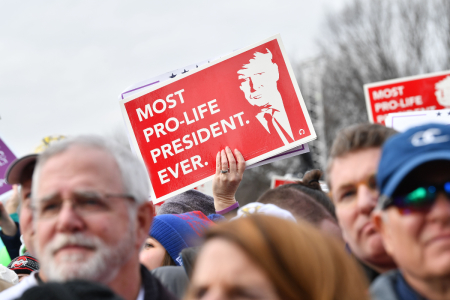Trump's comments on Florida's abortion ballot initiative, IVF draw mixed reactions from pro-lifers

Former President Donald Trump drew mixed reactions from pro-life advocacy organizations Thursday, with some believing he suggested he would vote for an amendment to create a right to abortion in the Florida Constitution, a claim a spokesperson has denied.
Trump, the Republican nominee for president of the United States in the 2024 presidential election, spoke with NBC News' Dasha Burns at one of his campaign rallies in Potterville, Michigan. She asked him how, as a Florida resident, he intended to vote on Florida's Amendment 4 that would "overturn the six-week ban" on abortion.
"I think the six-week is too short," he replied. "It has to be more time."
When Burns pressed Trump again on whether he would vote for Amendment 4, the candidate told her, "I am going to be voting that we need more than six weeks."
If passed, the measure would amend the Florida Constitution to read, "No law shall prohibit, penalize, delay, or restrict abortion before viability or when necessary to protect the patient's health, as determined by the patient's healthcare provider."
The proposal would not simply abolish Florida's six-week abortion ban that Trump opposes. It would have the effect of legalizing abortion up until the point of viability, which is defined as the point in a pregnancy where the baby can survive outside of the womb. A vote against Amendment 4 would keep the state's current abortion laws in place.
The interview's implication that Trump would support Amendment 4 drew mixed reactions from leaders in the pro-life movement, who once championed Trump as "the most pro-life president" in U.S. history.
Lila Rose, the founder and president of the pro-life advocacy group Live Action, described the candidate's comments during the interview as "totally devastating" in an X post Thursday.
While Rose insisted that "President Trump just announced he will vote in support of Amendment 4 in Florida, which permits abortions on babies up until birth, without restriction," Trump campaign spokeswoman Karoline Leavitt pushed back on this characterization of his position.
Asserting that the candidate "has not yet said how he will vote on the ballot initiative in Florida," Leavitt stressed, "He simply reiterated that [he] believes six weeks is too short."
In a statement, Susan B. Anthony Pro-Life America President Marjorie Dannenfelser, who co-chaired Trump's 2016 campaign pro-life coalition, said she spoke with Trump Thursday evening.
"He has not committed to how he will vote on Amendment 4," Dannenfelser said. "President Trump has consistently opposed abortions after five months of pregnancy. Amendment 4 would allow abortion past this point. Voting for Amendment 4 completely undermines his position."
"We strongly support Florida's current heartbeat law. For anyone who believes in drawing a different line, they still must vote against Amendment 4, unless they don't want a line at all," she added. "Amendment 4 would lock unlimited abortion into the state constitution, preventing the Florida legislature from enacting any changes."
Trump's remarks about Amendment 4 are not the only portion of his interview with NBC News causing pro-life leaders concern.
Trump also spoke on in-vitro fertilization, saying, "Under the Trump administration, we are going to be paying for that treatment." He elaborated on his policy proposal during his rally on Thursday.
"I am announcing today that under the Trump administration, your government will pay for or your insurance company will be mandated to pay for all costs associated with IVF treatment," he said. "We want more babies, to put it very nicely."
In an X post published Thursday, Rose cited his support for "universal IVF" as another example of what she characterized as Trump "embracing abortion on demand and testing his base."
Although billed as a fertility treatment, pro-life advocates have long criticized IVF as the practice results in the creation of many embryos that are often frozen and sometimes destroyed.
Rose noted that "Only 7% of embryos created via IVF will result in a live birth, the remaining 93% are frozen indefinitely, miscarried, or aborted," adding, "Over 1 million human embryos are already frozen from these IVF procedures."
She reflected on the religious liberty implications of requiring insurance companies to pay for IVF, asking, "How is this morally different than the contraceptive mandate under Obama?"
After an Alabama Supreme Court ruling this year determining that unborn children created through IVF are human beings under state law, politicians at the state and national level have sought to protect IVF.
Florida is one of several states where voters are slated to decide the fate of abortion-related ballot measures this year. Unlike the other states with such referendums, Florida requires proposed constitutional amendments to secure 60% support from voters in order to pass.
Public opinion polling paints a conflicting picture of whether the measure has enough support to pass. While an August 2024 survey of 837 voters from the Democratic firm Public Policy Polling shows that 61% of respondents plan to support Amendment 4 and 25% intend on opposing it, an August 2024 poll of 1,055 registered voters conducted by Florida Atlantic University and Mainstreet Research measured support for the constitutional amendment at just 56% with 21% indicating that they will oppose it.
Since the U.S. Supreme Court determined that the U.S. Constitution does not contain a right to abortion in the 2022 Dobbs v. Jackson Women's Health Organizationdecision, voters in four states have approved ballot measures establishing a right to abortion in their respective state constitutions. Voters in California, Michigan and Vermont supported such proposals in 2022 while Ohio did the same in 2023.
Ryan Foley is a reporter for The Christian Post. He can be reached at: [email protected]





















